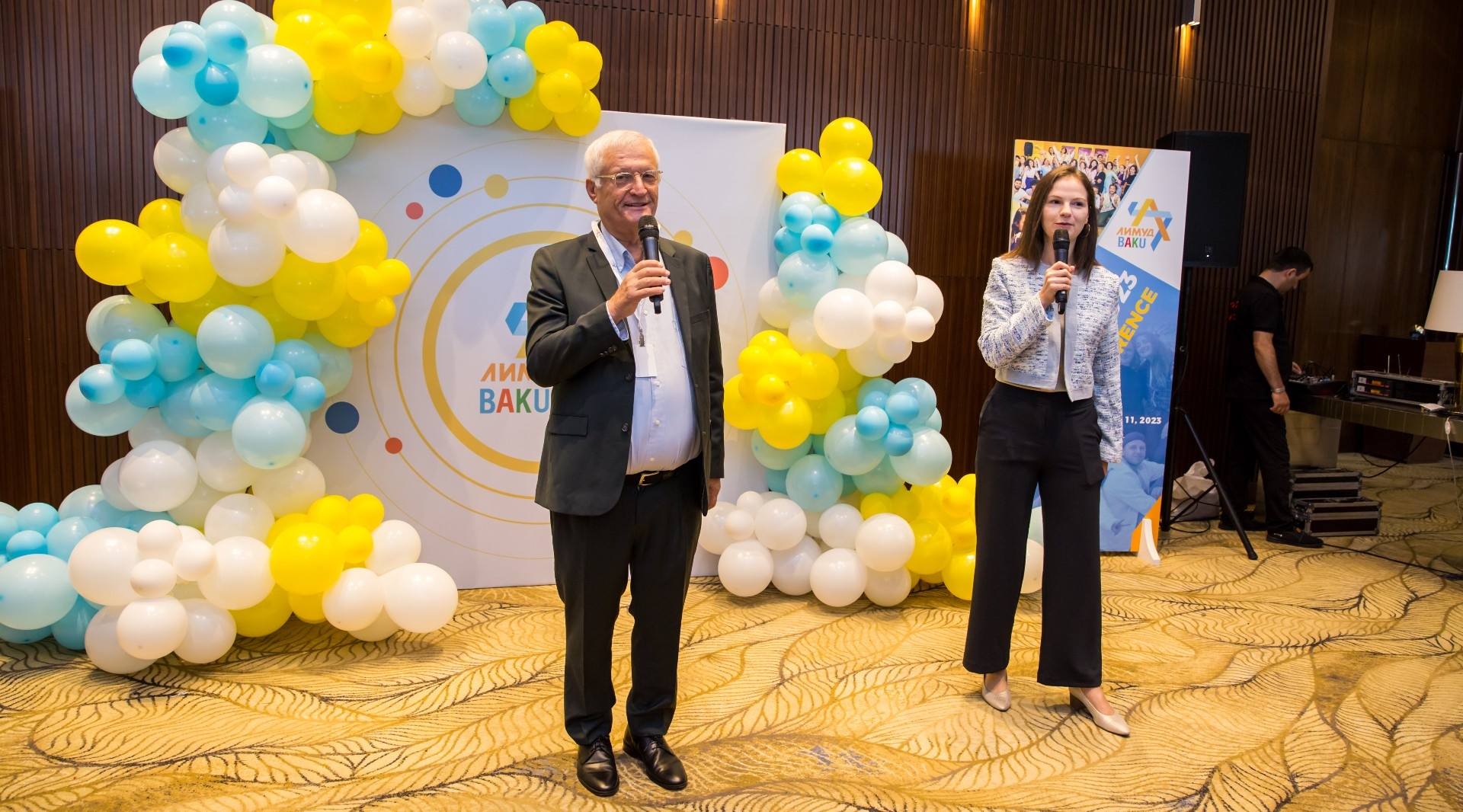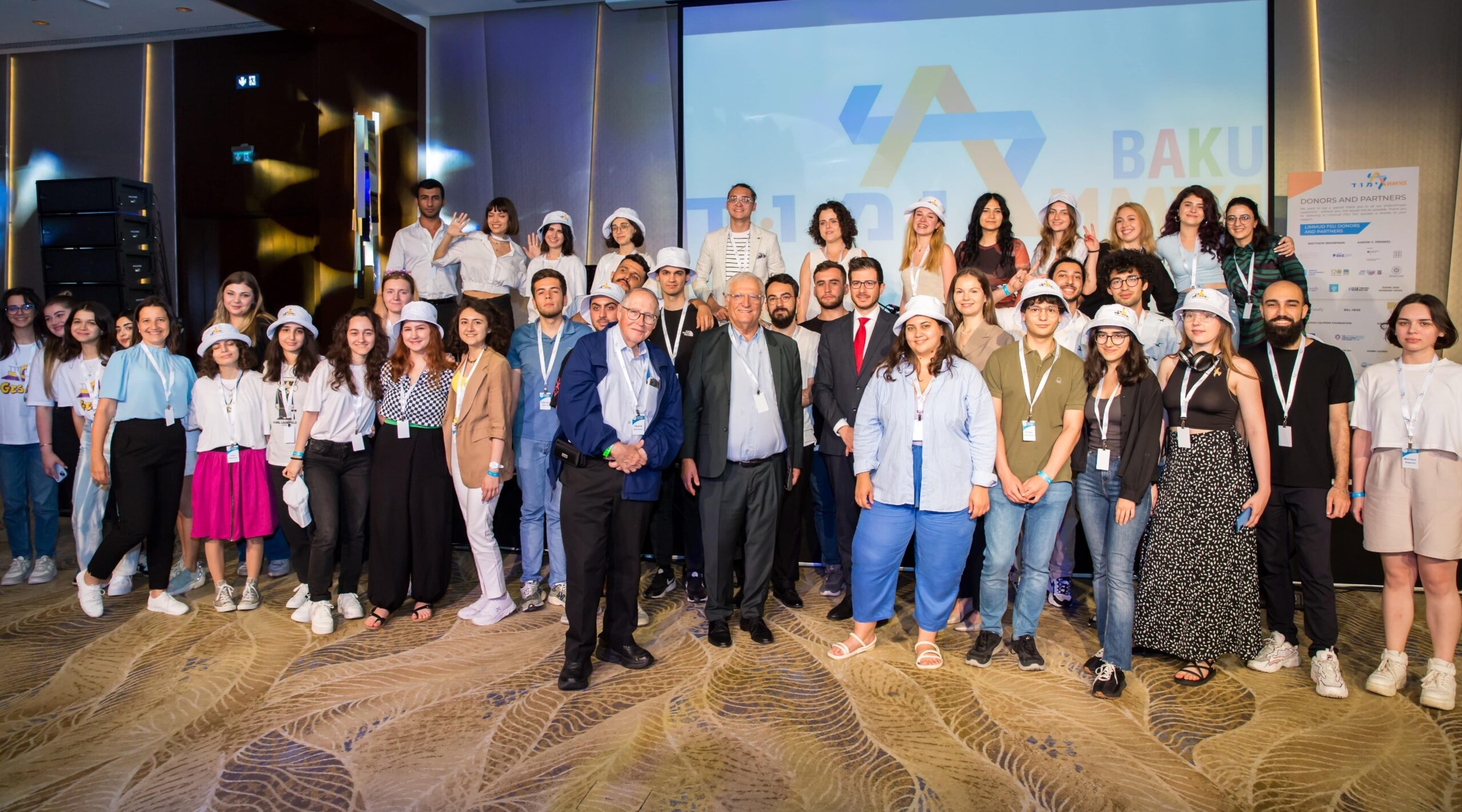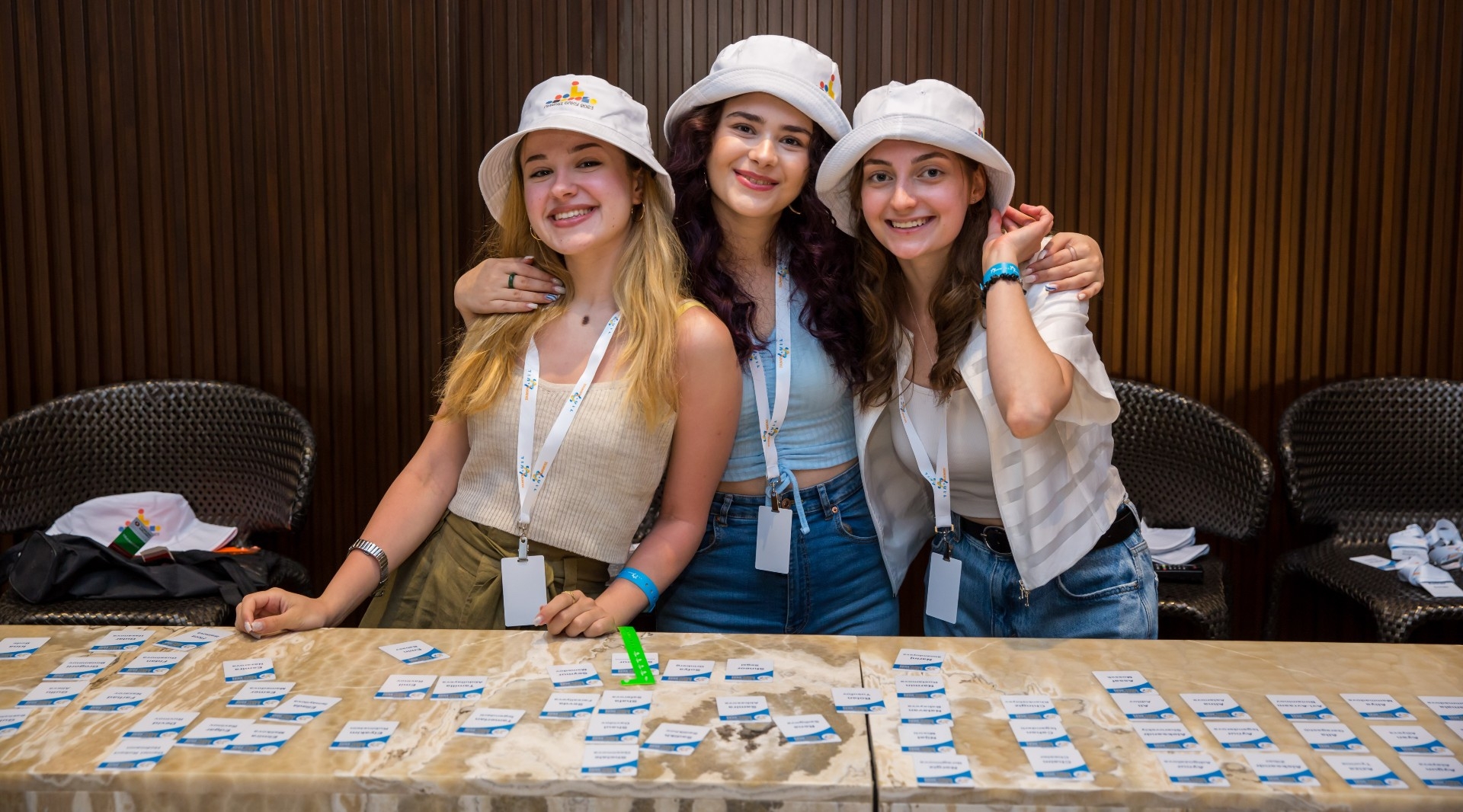Eli Khanukayev, an Azerbaijani Jew who works in information technology, spent a recent Sunday immersed in the Jewish culture of his native country.
The 23-year-old was among several dozen volunteer organizers at Limmud Baku 2023 — an all-day festival for Jews that drew some 300 people to a hotel overlooking the Caspian Sea in Baku, the capital of Azerbaijan. Khanukayev helped arrange speakers and children’s programs for the event.
“All in all, it was amazing that our group of young volunteers was able to accomplish this,” said Khanukayev, one of an estimated 15,000 Jews living in the predominantly Muslim former Soviet republic. “It’s comfortable being a Jew here. Most people who know I’m Jewish ask me to talk about it. They’re very welcoming. It’s always been like that.”
Fellow volunteer Ilyas Abushzada, 22, helped out with logistics as well as translating from Russian to Azerbaijani.
“I have a Jewish background. That’s why I was interested in this conference,” said Abushzada, a physics teacher at a private school in Baku. “It was a great experience for me, and I also met lots of new friends.”
The June 11 event was the second gathering in under a year in Azerbaijan for Limmud FSU, which promotes volunteer-led Jewish learning and cultural events around the world for Jews from the former Soviet Union.
The event was one sign of the growing relationship between Israel and Azerbaijan.
George Deek, Israel’s ambassador in Baku, noted the festival’s timing — less than three months after the inauguration of Azerbaijan’s embassy in Tel Aviv and only two weeks after the visit of Israeli President Isaac Herzog to Baku.
“Azerbaijan, one of our best friends, has long been a beacon of religious coexistence, where Muslims, Christians and Jews live side by side, respecting each other’s faiths and traditions,” said Deek, himself a Christian Arab Israeli from Jaffa, Israel.

Limmud FSU Founder Chaim Chesler, left, and Natasha Chechik, the executive director, at the Limmud FSU conference in Baku, Azerbaijan, June 11, 2023. (Emin Malishev)
Azerbaijan and Israel enjoy extensive commercial ties dominated by the energy and defense industries, a relationship that has intensified in the face of both countries’ concerns about the Iranian nuclear threat. Business also has begun to flourish in other areas, including agriculture, cyber technology, education, water and tourism. One of the most unique elements of Jewish life in Azerbaijan is Krasnaya Sloboda, an all-Jewish shtetl near the Russian border that’s home to the Museum of Mountain Jews.
“Let us embrace the historic milestones that have strengthened the ties between Azerbaijan and Israel,” Deek said, “and let us celebrate the power of Limmud and its tireless work in preserving and promoting Jewish identity in Azerbaijan.”
At the conference, participants were treated to a gala dinner, as well as musical performances by the local band HISS and saxophonist Deniz Abasova.
Topics of the day’s 30-plus sessions included ones on the history of Azerbaijan’s unique Mountain Jews, climate change in the Caucasus, Israel’s controversial planned judicial reforms — the latter talk hosted by a former vice president of Israel’s Supreme Court, Justice Elyakim Rubinstein. Also on the agenda: a workshop on bracelet making, an Azerbaijani wine-tasting panel and a discussion about Ukraine’s worsening humanitarian crisis.
“The program was really diverse,” said 19-year-old volunteer Leila Ismayileva. “So if one lecture wasn’t interesting, you could just attend another.”
Reflecting on the day’s success, Limmud FSU Founder Chaim Chesler said, “Our second gathering here shines as a testament to Azerbaijan’s rich Jewish heritage and welcoming spirit. The fusion of past, present and future here fuels the Jewish soul.”
Since its creation in 2005 to strengthen Jewish connections and identity among former Soviet Jews, Limmud FSU has held over 80 festivals around the globe that have drawn a combined 80,000 participants — including places as far afield as New York, Jerusalem, Toronto, Los Angeles and Boston.
Limmud FSU is led by chairman Matthew Bronfman, Chesler, and co-founder Sandy Cahn. Its work is supported by individuals and organizations including the Conference on Jewish Material Claims against Germany, Genesis Philanthropy Group, Nativ-Prime Minister’s Office, World Zionist Organization (WZO), Jewish National Fund – Keren Kayemet leIsrael, American Jewish Joint Distribution Committee (JDC), Jewish Agency for Israel, Wilf Family Foundation, Diane Wohl, Bill Hess and others.

Limmud FSU volunteers pause for a photo with Israel’s ambassador to Azerbaijan, George Deek (in center with red tie), former Israeli Supreme Court Justice Elyakim Rubenstein (in foreground) and Limmud FSU founder Chaim Chesler (in dark suit). (Emin Malishev)
“The Limmud FSU gathering in Baku encapsulates the resilience of our shared Jewish identity, demonstrating our solidarity against the shadows of antisemitism,” said Raheli Baratz-Rix, head of WZO’s Department for Combating Antisemitism and Enhancing Resilience. “It asserts that knowledge, unity and understanding are our most potent weapons.”
Also at the one-day conference Amos Lev-Ran, director of external relations at JDC-FSU, described his agency’s support of Ukrainian war refugees, and Mark Ifraimov, Nativ’s representative in Baku, discussed the fate of Azerbaijan’s Mountain Jews during the Holocaust.
“Nativ collaboration with Limmud FSU in Baku represents a powerful bond,” said Neta Briskin-Peleg, director of Nativ. “The Azerbaijani Jewish community stands as a symbol of enduring friendship between Israel and Azerbaijan. Together, we’re building bridges, fostering understanding, and highlighting the importance of these historic connections.”
Natasha Chechik, executive director of Limmud FSU, credited the volunteers with making the conference a reality.
“Our events are brought to life by the unyielding dedication of our remarkable volunteers,” Chechik said. “They are the heartbeat of our communities, the architects behind these extraordinary experiences enjoyed by so many. Their passion is the beacon that makes every Limmud shimmer.”
JTA has documented Jewish history in real-time for over a century. Keep our journalism strong by joining us in supporting independent, award-winning reporting.
This article was sponsored by and produced in partnership with Limmud FSU, which nurtures open, pluralistic, dynamic learning platforms across the world for Jews of all ages and backgrounds with roots in the former Soviet Union, while embracing the Jewish intellectual, cultural and religious traditions grounded in this shared experience. This article was produced by JTA’s native content team.
More from Limmud FSU





